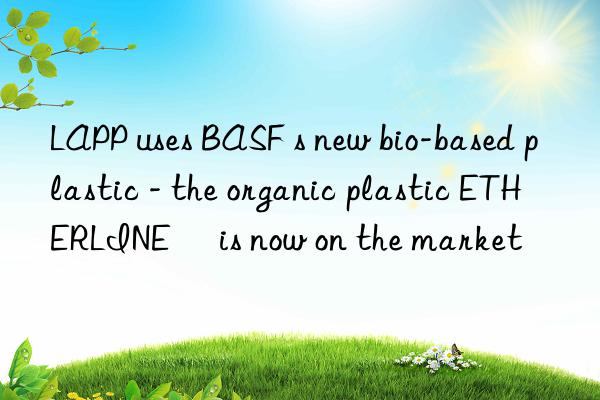
April 14, 2023 - LAPP and BASF are collaborating on sustainability. Both companies hope their products can help reduce carbon footprints. An important part of this is the use of bio-based plastics. LAPP will now present the first network cable with a sheath made of bio-based plastic at the Hannover Messe in Hall 11, Stand C05. The compound was developed by the chemical company BASF.
In fact, ETHERLINE® has long been used in industrial networks FD P Cat.5e has always existed in LAPP's product line. It is ideal for patch cord applications and cable chains. Now, it's back in a more sustainable version. The global market leader for comprehensive solutions in the field of cable and connection technology has replaced BASF's old TPU material (thermoplastic polyurethane) with BASF's new TPU. Whereas previous TPU sheath materials were based on fossil raw materials, the new material now used is based on renewable raw materials. U.I. Alexander Terpe, Head of Cable Product Development at Lapp GmbH: "Using plastics from rapidly renewable raw materials and on an organic basis reduces our need for plastics derived from fossil raw materials and is at the same time a way to reduce the carbon footprint of our products. good idea.
Sustainability starts with more sustainable products
That is bio-based plastic, BASF's thermoplastic polyurethane Elastollan® N. It is a bio-based polymer derived from corn. Depending on the type of TPU, the proportion of renewable raw materials can be 45% to 60%. The highlight is that this TPU has the same durability, flexibility and mechanical properties as traditional Elastollan®, as well as hydrolysis, chemical and UV resistance. Even the machinability parameters are the same. A special feature is that the proportion of biological material in the finished product can actually not only be detected, but also precisely measured (according to ASTM D 6866).
Oliver, Group Sales Manager, BASF Polyurethanes Ltd. Mühren explained: "BASF's bio-based TPU is a real high-performance product, in no way inferior to traditional fossil fuels. It can be quickly switched in production and brings real added value to our customers through more sustainable products."
From a life cycle assessment, biobased products reduce the CO2 footprint by 15%. Elastollan® N is part of BASF's circular economy strategy, which helps conserve fossil resources and reduce CO2 emissions. LAPP will also continue to expand its product portfolio of bio-based sheathing materials step by step.



 微信扫一扫打赏
微信扫一扫打赏
